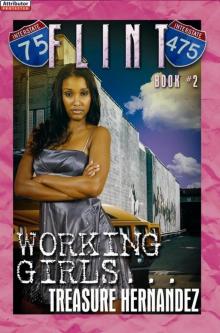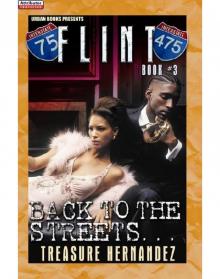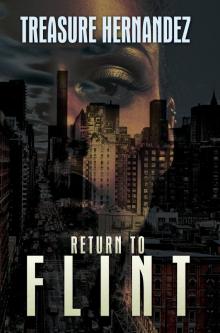- Home
- Treasure Hernandez
Carl Weber's Kingpins Page 5
Carl Weber's Kingpins Read online
Page 5
Kafisa lay in the back of her father’s Denali, in pain, traumatized by the whole ordeal she had just experienced. When she closed her eyes, flashes and images of what she had just done flooded her mind as the sounds of the guns going off still rang in her ears. She had no idea what had possessed her to go into her book bag and pull out one of her father’s .40 calibers, nor could she recall even going into the bag, let alone pulling the trigger. When her father had pulled the body out of the truck and had let it fall to the pavement, she’d known that this was not just some nightmare that would go away in time. This was real, and someone had just died by her hands.
The thought of her taking someone’s life was enough to send chills through her entire body. She envisioned Hub’s body lying there, his eyes still open. As the reality of the whole situation began to set in and she was able to play it back, Kafisa felt no remorse or regret for what she had done. She reasoned with herself that if it were not the assailants lying out there back in the parking lot, it would be her own father, and she would have never known that, because she would have been raped, then killed, too. Thus, it was because of her actions that she was still alive to see her father survive, and she was content with what she had done.
Kafisa’s thoughts returned to the present as she entered the domain that she knew to be her home. A warm feeling greeted her and swept through her body. For her, this was a place filled with many memories from the past, mostly good ones, and a few bad ones to go along with them, but overall, she had no real complaints about her upbringing, despite her mother’s beliefs. To become the young woman that she had become, after being raised the way she had been raised and by whom, said a lot about Kafisa as a female. She was proud of herself. She knew that she fell into the small, exceptional percentage of people in the world who would succeed in life when they reached adulthood, despite their parents’ lack of parental skills.
Despite the fact that her mother and father had never married and had not been together for most of her life, that her mother had fallen victim to drugs, that her father had been a notorious drug dealer and gangster from the time she was born, and that she had grown up around drugs, Kafisa believed that she had turned out pretty well. Given that her father had both educated her about and exposed her to the streets, she knew that instead of going off to college and getting her degree, she could have easily chosen to spend the next four to six years of her life in the family business. Kafisa strongly believed that if she got into the drug game, she would become just as successful at it as her father. She was convinced it was in her blood.
Kafis wouldn’t hear of it. So, she had chosen the academic route instead. Kafisa was determined to continue to work hard in school and to obtain her law degree. Her father had plans for her the moment she got her law degree. He had a job awaiting her in New York City, at a well-known law firm. The thought alone motivated Kafisa. She figured if she couldn’t represent her father and his crew in the streets, at least she could represent them in the courtroom if they ever needed it. Kafisa smiled at the irony of it all.
Kafis thought he had heard his name being called, but he wasn’t sure due to the surround sound in his theater room blaring through the speakers. He paused the Black Caesar DVD he was enjoying on his built-in flat-screen plasma TV. He heard his name being called again. He immediately recognized the voice. A smile spread across his face as the voice drew near. By the time Kafis turned around, Kafisa was standing in the doorway of the plush theater room. As quickly as he could, Kafis got up out of his seat and met his daughter in the middle of the room.
“Hey, baby girl!” he said, holding out his arms to hug his only child.
“Hey, yourself, old man,” Kafisa replied, welcoming her father’s arms. She embraced him and returned his hug.
A grin covered Kafis’s face at his daughter’s reference to him being old. He didn’t look or feel a day older than thirty. Kafis considered himself to be somewhat of a health nut. He was on a strict no-meat diet and exercised daily. He also believed that all the young females he surrounded himself with kept him feeling and looking young and healthy, but for the past few years, ever since he had passed the forty-five mark, Kafisa had joked about him getting up there in age.
“I see you still got jokes,” he replied with a little sarcasm.
Kafisa detected the sarcasm in Kafis’s tone. She knew that her father did not like to be reminded of his age, but she deliberately teased him about it every opportunity she got, to remind him of just how long he had been in the game. Kafisa knew, however, that the reality of the matter was that for his age, her father looked exceptionally good and was able to stand next to the best of the best youngsters in the game who had it going on both in the appearance department and in the financial department.
Oftentimes when they went out together, he was mistaken for her man rather than her dad. Despite the fact that Kafis appeared young in her eyes and everyone else’s, Kafisa felt that her father was just too old to still be living the life, playing the game. Technically, she was not from the streets, but because she had been raised by someone who was, she knew what the streets were about and what the rules, both old and new, that governed them were, which was why she worried so much about her father.
Kafis was from what would be considered the old school, which meant that the individuals who played the game respected it and the rules by which it was played. Back in Kafis’s glory days, everyone knew their position and played it, whatever it might be, and if you were the type who could play different positions, then you were one of the elite, a ghetto superstar in the game, so to speak. Kafis had told Kafisa stories about how it was growing up, how you had to know how to fight, and how you would fight if necessary, if you wanted to hold on to your girl, your money, or establish a credible reputation. Back then everybody simply respected the game, which was why rats and snitches didn’t get any love. There was a unique way during Kafis’s era of marking those who took the cowardly way out in the game, making it easy for those who played by the rules to identify them on sight, compliments of spots like Trenton State Prison and Rahway State Prison in New Jersey, along with Rikers Island and Sing Sing in New York, and numerous other prisons keeping it gangsta around the globe.
Kafisa remembered when her father had shared with her his first experience of prison at the young age of nineteen, long before she was even a sperm cell and an egg. He had been sentenced to a five-year bid after copping out to a conspiracy to possess CDS and taking a plea bargain to avoid going to trial after finding out that the state’s key witness against him was a close friend of his at the time. While waiting to be shipped upstate, he came across the state’s key witness on Rikers Island. It was then that he was schooled in the popular saying “Snitches get stitches,” and that was exactly what he gave the kid: a buck fifty from his temple all the way down the side of his cheek, a lifetime scar to remember his disrespect.
Nowadays snitches didn’t get stitches. They got trips and vacations, and that was exactly why Kafisa feared for her father. Under the new-school rules, you had participants getting into the game who were not representing the positions that they were playing. For instance, the ballers who stacked chips and had never been to jail, or had been to jail and didn’t want to go back, they caught diarrhea of the mouth about those who professed to keep it gangsta, put that work in, and their guns went off. When retaliation came into play, they knew who had shot ’em, according to the police report. Then there were those who simply hated on you because they weren’t you, so they dropped a dime on you.
Kafisa was well aware of how her father carried it in the streets, and she knew that any of these three scenarios could easily pertain to him if he continued to outthink and outdo the new breed of money getters, who were finding it somewhat difficult to come up in the game due to Kafis’s and his team’s existence in the streets. Sometimes she wished that she could have just had a normal childhood and normal parents with a normal life. Then again, what was normal for two individuals who had
grown up in poverty-stricken households? she wondered.
Kafisa knew it was going to be what it was going to be. She reasoned with herself, like she had so many other times before, and was grateful for what she had and what she had learned from her father. A smile came across her face. “I’m just messin’ with you, Dad. You look nice. It’s good to see you doing well. I’ve missed you,” she said, her words sentimental.
“I missed you too, baby girl, but don’t be getting all soft on me now,” replied Kafis, with half of a smirk on his face.
“I’m not!” she answered defensively, still smiling.
Kafis was as tough as they came, but when it came to his daughter, he melted like fried ice cream whenever she showed her emotional side to him. He had raised her to be just as tough and emotionless as he was, but at times her mother’s side of her would come out and get the best of her, and him too.
Kafisa reminded Kafis so much of her mother before the drugs got to her. She was a lighter version of her mother. Each time he looked at her, it made him realize just how much he really did miss Camilla. Kafisa had inherited her long, silky jet-black hair, along with Camilla’s light brown, slanted Asian eyes and her deep dimples when she smiled. She was at least three inches taller than her deceased mother, who had stood at five feet eight, but they were both built similarly. Camilla had had the shape of a supermodel, with the posture to match. She had been in between the size of Naomi Campbell and Tyra Banks, and hands down, she would have given them both a run for their money if she had been a model. Kafisa possessed that same build, but that was where it stopped. Physically, Kafisa bore a resemblance to her mother as an adult, but internally, she was her father’s daughter all the way.
“What are you still doing in New York, and why didn’t you call and tell me?” questioned Kafis. His tone and demeanor had become more serious. He remembered that he had given Kafisa specific instructions not to stay in New York after her mother’s funeral, out of concern for her safety. There was a territorial beef between his team and some young and upcoming gunners, who were wild enough to send a message to him by doing something to her.
“I didn’t call, because I wanted it to be a surprise. Besides, I wanted to see you,” Kafisa replied innocently, seeing the seriousness on her father’s face. She grimaced. She hated when he made her feel like a little girl. She locked eyes with him until he broke his stare.
Kafis shook his head and let out a gust of hot air in frustration. He had expected Kafisa to give him the answer that she had. He knew how dangerous it was for her to be in town, but he understood why she had to come. A vast amount of time had passed since he had last seen his daughter, and her arrival was a nice surprise. Only she could make him feel the way he was feeling now. Since the day she was born, Kafisa had been her father’s kryptonite. It was at times like this when he thought strongly about getting out of the game and just living an ordinary life, but he knew that right now this was impossible.
“I know, baby girl, and it’s good to see you too.” He smiled. “What’s left of you, anyway,” he added, making a joke about the weight she had recently lost.
Kafisa rolled her eyes. She was actually proud of herself for the pounds she had shed. “What’s that supposed to mean?” she asked, with her hands on her hips, already knowing what it was that he was insinuating.
“That means you need some meat on those bones of yours. What? You don’t like the food in South Carolina? Them women love to eat down there in the South. Don’t tell me you goin’ Hollywood on me,” Kafis teased.
“Dad, please!” She paused, waving at him with her hand. “You so corny, and so old school, I might add.”
Kafis laughed. He always got a kick out of Kafisa referring to his style as old school, although in reality he was, and he was proud of it. Being old school was what kept money in his pockets, a roof over his head, and it was what had enabled him to live as long as he had in the game. He smiled at the thought.
“What?” asked Kafisa, catching his smile.
“Nothing. It’s just good to have you back home,” he answered, his eyes wet with tears, as he leaned in and hugged her. “Now, can an old-school dad take his old-and new-school daughter out to eat?” Kafis asked jokingly.
“Of course you can, sir.” Kafisa lit up like the Fourth of July.
It was good to be back home, regardless of the reason that had brought her back. Above all, it was good to see her dad.
Chapter Four
“Kafis, what’s doing, my friend? It’s always a pleasure.” The maître d’ greeted Kafis with a handshake and a hug.
“Same ole, same ole, Fran,” replied Kafis, embracing the short Italian man with a small build.
Francis Costillo, whom he called Fran, was as connected as they got. Ever since Kafis saved his life at Fort Dix, a federal prison, the two had been as thick as thieves. Under any other circumstances, Fran’s family would have had a problem with their association, but Kafis’s reputation spoke for itself. He was respected by all, no matter their gender or the color of their skin.
“And I see you brought your beautiful princess along with you this time.” Fran directed his attention to Kafisa. “Fee, it’s been a while, sweetheart. Come here.”
Kafisa didn’t budge.
“What? You don’t remember Uncle Fran no more?” he asked her, then planted a kiss on each side of her face.
That caused Kafisa to blush instantly. She had known the maître d’ for almost her entire life, since long before the Village Café opened up six years ago. When she first met Fran, she had been just a little girl. At least once a week she and her father would travel out to Staten Island, New York, for dinner in the evening and cookouts during the summer. Going to Fran’s house was one of the most memorable highlights of Kafisa’s childhood because it entailed riding the Staten Island Ferry, and she had always enjoyed getting on the ferry. It was then that she fell in love with boats and the ocean, causing her to persuade her dad to buy a boat when she got older.
In a way, Fran was like an uncle to her, because he had always been there for her the way any uncle would be there for his niece. Kafis had no sisters or brothers, but because the two people he trusted the most and some of his other comrades had kids, it was as though she had a bunch of cousins to play with. Other than Kafis’s right-hand man, Fran was the closest thing her dad had to a brother. Fran had a son, Francis III, who was two years younger than Kafisa, and a daughter, named Francine, who was two years her senior. They both treated Kafisa like a sibling.
Kafisa knew her dad trusted Fran and had the utmost respect for him. She could recall the countless nights Fran had babysat her in Staten Island while her dad took care of business. He was the only man Kafis had trusted enough to leave her alone with. That had made it easy for her to embrace Fran’s kids. Kafisa and Francine would stay up all night and talk about what they wanted to do and be when they got older, while Francine’s little brother would help his dad count money, the same way Kafisa helped her dad. Ironically, she and Francine both wanted to be attorneys so that they could represent their families, if need be, whereas Francis III was being prepped to carry the family torch someday. Francine had been a friend and a big sister for Kafisa all throughout her childhood.
The love between her father and the Italian man had always been readily apparent. Kafisa had seen the two of them lend each other money and cars, something that she had never seen Kafis do with anyone else. It wasn’t until she was older that she realized what that was all about. She remembered being in Fran’s wedding, alongside Francis III and Francine. She also remembered when Fran opened the full restaurant with a bar up on Richmond Hill Road, a restaurant that had an Italian ice stand outside. To her, there was no Italian food restaurant that could compare to her uncle Fran’s Village Café.
“Uncle Fran, now you know it’s not even like that,” Kafisa replied. “You know how much I love you. You’re my favorite uncle,” she added, flattering him.
“I’m your only uncle, s
weetheart,” he shot back, with a smile and a wink to go with it.
Everyone smiled.
“Fran, how’s your wife Concetta, li’l Fran, and Francine?” asked Kafis.
“You know, Concetta is still Concetta, and my boy, well . . . he’s still trying to find his way,” Fran replied with his Sicilian accent, keeping his same smile. “Now, Francine, my pride and joy . . .” He beamed. “She’s a hotshot lawyer now. Works for a one of the top law firms in Manhattan.”
Kafisa smiled. “Nice. Please let ’em know I send my love.” She paused for a moment. “And I’d like to get Francine’s number before I go, if you don’t mind.”
“Absolutely. No bother at all. Let me just get you guys squared away.”
Both Kafis and Kafisa nodded.
“My apologies, Fran,” Kafis said. “I know we just popped up on you, but this one here just popped up and surprised me after Camilla’s funeral.”
Fran’s look switched to serious. “First, my condolences. . . Where’s my manners?” He placed his hand on his chest and bowed in Kafisa’s direction. “It slipped my mind completely,” he said apologetically.
“Thanks, Uncle Fran.” Kafisa’s words were low and dry. She couldn’t care less about the death of her mother.
Fran eyed Kafis.
Kafis grimaced.
Fran immediately picked up on it and changed the subject. He knew the history and the reason for Kafisa’s coldness about the entire matter. “As for you . . .” He directed his attention to Kafis. “Please don’t insult me like that, brother. Where there’s no room for others, there is always room for you. As we speak, your table awaits,” Fran stated sincerely.
“My bad, brother. Thank you.”
“Come on. Forget about it! Don’t make me cry. Enjoy your meals. Everything is on the house. Ralphie will show you to your table,” Fran said as a young Italian waiter appeared with two menus in hand.

 Girls from Da Hood 12
Girls from Da Hood 12 Girls from da Hood 14
Girls from da Hood 14 Girls From da Hood 8
Girls From da Hood 8 Obsession 3
Obsession 3 A Girl From Flint
A Girl From Flint Belle
Belle Carl Weber's Kingpins
Carl Weber's Kingpins The Finale
The Finale The Block
The Block Baltimore Chronicles
Baltimore Chronicles Working Girls
Working Girls Magic Touch
Magic Touch Around the Way Girls 11
Around the Way Girls 11 Back to the Streets
Back to the Streets Full Figured 11
Full Figured 11 Keeping Secrets
Keeping Secrets Obsession
Obsession Girls From Da Hood 10
Girls From Da Hood 10 Back in the Hood
Back in the Hood Choosing Sides
Choosing Sides Return to Flint
Return to Flint Resurrection
Resurrection